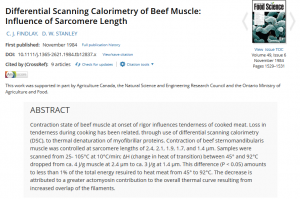Differential scanning calorimetry of beef muscle: Influence of sarcomere length
 Contraction state of beef muscle at onset of rigor influences tenderness of cooked meat. Loss in tenderness during cooking has been related, through use of differential scanning calorimetry (DSC), to thermal denaturation of myofibrallar proteins. Contraction of beef sternomandibularis muscle was controlled at sarcomere lengths of 2.4, 2.1, 1.9, 1.7, and 1.4 μm. Samples were scanned from 25-105 ºC at 10 ºC/min; ΔH (change in heat of transition) between 45 º and 92 ºC dropped from ca. 4 J/g muscle at 2.4 μm to ca. 3 J/g at 1.4 μm. This difference (P < 0.05) amounts to less than 1% of the total energy required to heat meat from 45 º to 92 ºC. The decrease is attributed to a greater actomysin contribution to the overall thermal curve resulting from increased overlap of the filaments.
Contraction state of beef muscle at onset of rigor influences tenderness of cooked meat. Loss in tenderness during cooking has been related, through use of differential scanning calorimetry (DSC), to thermal denaturation of myofibrallar proteins. Contraction of beef sternomandibularis muscle was controlled at sarcomere lengths of 2.4, 2.1, 1.9, 1.7, and 1.4 μm. Samples were scanned from 25-105 ºC at 10 ºC/min; ΔH (change in heat of transition) between 45 º and 92 ºC dropped from ca. 4 J/g muscle at 2.4 μm to ca. 3 J/g at 1.4 μm. This difference (P < 0.05) amounts to less than 1% of the total energy required to heat meat from 45 º to 92 ºC. The decrease is attributed to a greater actomysin contribution to the overall thermal curve resulting from increased overlap of the filaments.
![]()
Findlay, C.J., Stanley, D.W. (1984). Differential scanning calorimetry of beef muscle: Influence of sarcomere length. Journal of Food Science, 49(6), 1529-1531, 1534.